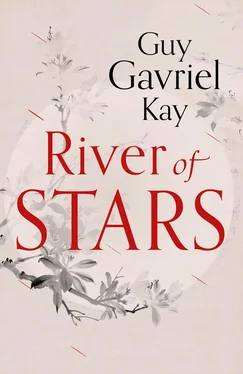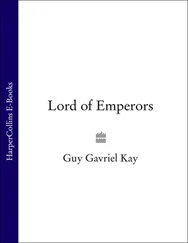He could remember travelling to the capital with his own father (long gone, dearly missed) and his brother. He’d been twenty-three years old. Three months’ journey to Hanjin, to prepare for and take the examinations. He had come first in their year; Chao, two years younger, had come third. They launched you into life like an arrow, results like that—and sometimes you landed in strange places. Arrows could go astray.
There came a time, he thought, lying in his cot-bed, when the years you had lived, your memories, stretched too much further behind than the years you could imagine in front of you.
He lay there a little longer, thinking of his dead wife and his living one, and women he had loved. There was a girl here who tended to their cottage. He did not lie with her. His son did, when Chen was with the clerics at the temple. It was better that way. His thoughts drifted to another girl, the one in Wengao’s home in Yenling. His last visit there.
She had offered herself to him, a spring night during the Peony Festival, standing in the corridor outside her room in a spill of light. He had looked back (vivid memory!) at the youngness of her. And had realized what she was doing. An illumination, like a lamp.
He had bowed to her, and shaken his head. “My everlasting thanks,” he’d said. “But I cannot accept such a gift.”
She’d be married now, for years. Perhaps with children. She’d been offering him her innocence that night, in sorrow: for strength on a terrible journey, and on Lingzhou.
She had been remarkably clever, Chen remembered, for someone so young. Over and above the fact that this had been a woman, a girl. He had encountered clever women, after all.
Too great a gift she’d been offering. He was, he thought, a man easier with giving gifts than accepting them. Nor did he follow Arcane Path teachings in the matter of lovemaking. (The emperor did, everyone knew.) You did not spend a night with a woman, Lu Chen had always believed, for whatever mystical strength you might gain from her.
You did it for pleasures you could share.
He wasn’t a good observer of doctrines. He would admit to that. He’d said it to the clerics here, his first visit, when they rang their one tall bell and prayed. He offered prayers with them, sincerely, but after his own fashion. His own doctrines were about compassion, the brush strokes of words, painting, conversation, enduring friendship, family. Laughter. Music. Service to the empire. Wine. The beauty of women and of rivers under stars. Even if you thought you were at the Red Cliffs of legend and you weren’t.
You needed to be able to laugh at yourself, too.
Watching the light in the east, he smiled. It was a good memory, that corridor in Xi Wengao’s house many springs ago. She had been generous, he had been virtuous. You could hold to such moments, hold them up to morning’s light.
It was time to rise, before the heat grew stupefying. He dressed in his hemp robe, worn through, too big for him now with the weight he’d lost. He put on his hat, as always, pinned thinning hair. He didn’t look at mirrors any more. He lit candles, poured out three cups of wine, prayed for his parents’ souls, and his wife’s, at the small altar they had made here at world’s end. He prayed for the ghost-woman. That whatever had denied her rest might ease and pass, be forgiven or forgotten.
Mah had been up earlier, as always. He had rice and chestnuts on the fire in the front room, and yellow wine warmed for his father.
“I think we’ll see the sun again today,” Lu Chen pronounced. “I propose we rally our wild bandit company and storm the fortress of the evil district overlord.”
“We did that yesterday,” his son said, smiling back at him.
His concubines were wailing in the women’s quarters like unburied ghosts. Kai Zhen, deputy prime minister of Kitai—until this morning—could hear them across the courtyard. Their voices twined and clashed unmelodiously. He had a large house (he had several large houses) but they were making a great deal of noise in their lamenting.
He felt like wailing himself, in truth. Or killing someone. He paced his principal reception room, window, wall, window, then back again, too agitated to sit, to eat, take wine, compose letters. What letters could he write?
His world had just ended. It had exploded like one of those new devices that launched fire-arrows over the walls of cities under siege.
Wu Tong, his protégé, his ally in the Flowers and Rocks Network and a shared ascent to power, hadn’t taken siege weapons north against the Kislik capital.
Sometimes the known, verified truth remained impossible to believe.
Had the eunuch and his commanders been driven mad by desert winds? Tormented to that state by some malign spirit intending their destruction? Intending Kai Zhen’s even more?
How did you forget siege weapons on your way to take a city?
This morning’s business of the court gentleman—that insignificant garden-book writer whose name he could barely recall—was trivial, it was nothing! Or it should have been. What were the chances the emperor, obsessed with the ideal placement of a new Szechen rock, or aligning a row of pagoda trees, would pause to read a letter, or care about a meaningless figure’s exile?
Even if he did, even if the accursed blind one brought it to him for his own black reasons, it should have been a simple matter to prostrate oneself, express bottomless contrition, and reverse the order of exile, explaining it away as a matter of zeal in the service of the emperor. He couldn’t even remember what had been irritating him the day he decreed Lingzhou Isle for a nonentity. He could barely remember doing it.
How could such a man matter in the unfolding of the world? He didn’t. That was the point! Even with an apparently well-crafted letter from his unnatural daughter—her life a smear on the proper conduct of a woman—Wenzong would have done no more than raise an imperial eyebrow from under his hat and suggest the exile might be made less onerous.
If it hadn’t been for the army, the disastrous retreat through the desert from Erighaya’s walls, the lack of siege engines, the death of seventy thousand …
The eating of officers, drinking their blood, as they retreated south.
And even with that, if it hadn’t been for some nameless, unknown, impossible-even-to-imagine gardener (the outrageousness threatened to choke Kai Zhen) weeping near the emperor …
How had he even dared ? It was unjust beyond words! Kai Zhen had been dazzlingly close, brilliantly so, to having all he needed, wanted, had ever aspired to have.
Almost all his wife needed, as well. Though she would always want more. It was embedded in her being, that wanting. They never said it aloud, but he knew she thought about an empress’s headdress.
The thought made him look quickly over his shoulder. By now he had a sort of intuition when she might be in a room, though her movements were utterly quiet, no brushing of a robe along the floor, no slap of slippers, sound of breathing, of keys or fan at her waist.
His wife was a silent creature when she moved, and terrifying.
They were alone in the chamber. It was richly decorated. Bronzes from the Fifth, porcelain, south sea coral, sandalwood chairs, wall panels with ivory inlays, a rosewood writing desk, poems in his own (exceptional) calligraphy hanging on the walls.
Kai Zhen had good taste, a discerning eye. He was also a very wealthy man, his fortune growing swiftly after he and Wu Tong conceived of the Flowers and Rocks. The two of them had met through that idea and risen together with it, as if from a deep lake, to transcendent heights.
Kai Zhen had come to Hanjin and the court the way one of his magnificent rocks or trees had come.
Читать дальше












